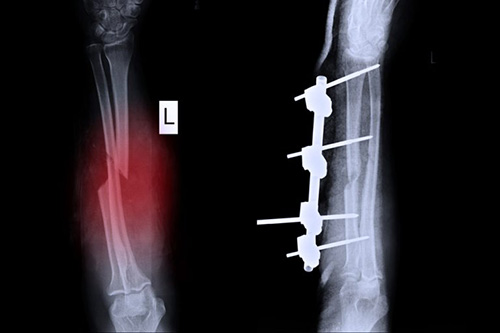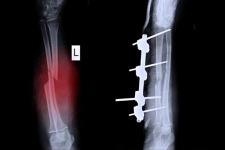Internal fixation is a surgical procedure that is done to help set a fracture and reposition bones/bone fragments into normal, proper alignment. This is accomplished with a variety of different implants including plates, screws, rods, and wires (that are made from either titanium or stainless steel). Now, while this may sound a bit scary, it’s really not…we promise! Here’s how the various implements that orthopaedic surgeons use for internal fixation work to ensure optimal healing:

Plates
Plates act kind of like internal splints that hold pieces of bone together. They are attached to the bone via screws and are often left in place even after healing is complete.
Screws
Believe it or not, but screws are used for internal fixation more than any other type of implant. Screws come in all different sizes and can be used alone or in conjunction with plates, nails, or rods. Once the bone in question is completely healed, it’s possible that the screws may be removed – that’s a decision that your orthopaedic surgeon will make.
Nails and Rods
When it comes to long bones, sometimes the best way to hold them together is by inserting a rod or nail through the hollow center of the bone (this would be the area of the bone that normally contains marrow). Screws are used at each end of the rod to help keep everything in place so that the bone heals properly and without any shortening or rotation.
Wires and Pins
Wires are oftentimes used to pin bones back together – especially pieces of bone that are too small to be fixed with screws. Oftentimes wires are used in addition to other types of internal fixation but can be used by themselves to treat fractures in very small bones, like those found in the hands and feet. After a certain amount of time wires may be removed; however, sometimes they are left in place permanently.
Visit Prairie Ortho
After sustaining any type of fracture, it’s important to visit your orthopaedic surgeon so that the injury can be evaluated by a specialist who will know exactly what type of treatment is needed to allow your injury to heal properly. Sometimes that may require surgery and sometimes it may not. Either way, you’ll be in the best hands possible here at Prairie Orthopaedic and Plastic Surgery, PC. Contact us at 402-489-4700.

